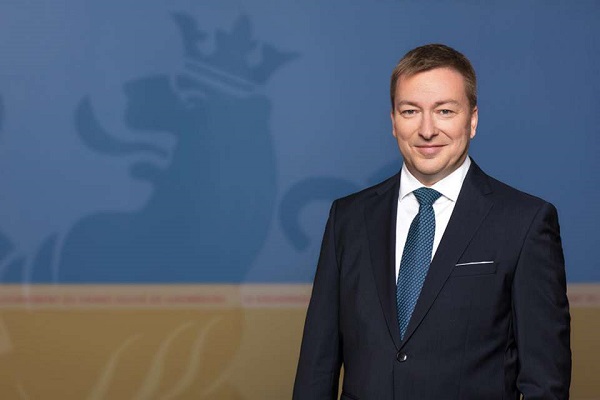 Marc Hansen, Luxembourg's Minister for Digitalisation;
Credit: © SIP / Yves Kortum
Marc Hansen, Luxembourg's Minister for Digitalisation;
Credit: © SIP / Yves Kortum
On Friday 4 February 2022, Luxembourg's Minister Delegate for Digitalisation, Marc Hansen and Chairman of the Governing Council of the University of Luxembourg representing the Interdisciplinary Center for Security, Reliability and Trust (SnT), Yves Elsen, have signed a framework agreement for a period of four years by which the Ministry of Digitalisation uses the skills of the SnT to promote and strengthen the digital transformation of public administration as well as the digitalisation of administrative procedures in Luxembourg.
This is a new approach for the Ministry of Digitalisation through which it benefits in particular from access to working prototypes demonstrating that technology can solve a concrete challenge for the public sector as well as from a transfer of knowledge, through access to innovative technologies.
Following the agreement, specific topics will be addressed through concrete collaborative research contracts. This cooperation will contribute to and complement the work done to achieve the Ministry's objectives in terms of public sector data, interoperability, digital inclusion and GovTech solutions.
The first contract, signed on the same day as the framework agreement, concerns the exploration of use cases for digital identities. It is about exploring the implications of digital identities and digital wallets from a strategic and technical perspective.
The "Digital Identities for Luxembourg" project will help further position Luxembourg as a digital forerunner and shape the implementation of these identities at European Union (EU) level. Digital identities and digital wallets have the ability to create secure identities for citizens, so that they can effectively protect their personal data. With many possible use cases, the technology could be revolutionary for public administration, but also in sectors such as health and banking.
According to Minister Hansen, the state is the trusted source and issuer of identity documents in the physical world. "In the transition to completely digitised processes, it is also up to the State to take its responsibilities by implementing reliable and secure solutions that make it possible to complete procedures and transactions online."
The project is also part of the European Commission's initiative for a European digital identity wallet. The objective is to accompany and support the government in the implementation of this EU initiative. “With the EU COVID digital certificate, we are now used to showing our smartphones to certify our vaccination status. With digital identities, we will be able to certify any information, that we are of age, that we have a valid driver's license or a ticket for a concert - all without revealing private information that is not necessary in a specific situation. We can also do this online or in person,” said Professor Gilbert Fridgen, lead researcher on the project.
“Inefficient management and exchange of personal data reduces competitiveness and complicates regulatory compliance. It is estimated that these block around 3% of Luxembourg's GDP. We are proud to help the Grand Duchy unlock this potential and to be at the forefront of European innovation in the development of digital identities. Moreover, this project is a perfect example of SnT's mission. We conduct internationally competitive research in ICT to create socio-economic impact,” said Björn Ottersten, Director of SnT.









